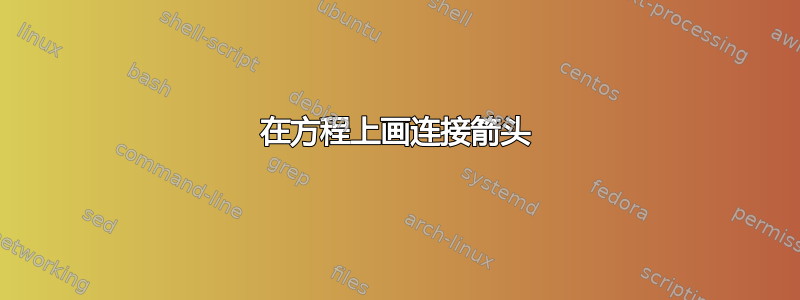
我想画出如下图所示的箭头,抱歉图像质量较差。
公式如下:
\lambda_1(2,1,-1) + \lambda_2 (1,1,1) = (4,1,-5)
关于如何实现这一点有什么建议吗?
编辑: 尝试在这里搭建这段代码但失败了,没有任何结果出现:
https://tex.stackexchange.com/a/168978/107417
在帖子中添加了包和命令,并将我的方程式代码更改为
\begin{equation*}
\source{\lambda_1}(2,1,-1) + \source{\lambda_2} (\target{1},1,1) = (\target{4},1,-5)
\end{equation*}
编辑2:
\documentclass[11pt]{article}
\usepackage[T1]{fontenc}
\usepackage[utf8]{inputenc}
\usepackage{amsmath}
\usepackage{tikz,pgfplots}
\newcounter{source}
\newcommand\source[1]{%
\tikz[remember picture,baseline,inner sep=0pt] {%
\node [name=source-\thesource,anchor=base]{$#1$};
}%
\setcounter{target}{0}
\stepcounter{source}
}
\newcounter{target}
\newcommand\target[1]{%
\tikz[remember picture,baseline,inner xsep=0pt] {%
\node [name=target-\thetarget,anchor=base]{$#1$};
}%
\setcounter{source}{0}
\stepcounter{target}%
}
\newcommand\drawarrows{
\tikz[remember picture, overlay, bend left=45, -latex] {
\foreach \j [evaluate=\j as \m using int(\j)] in {1,...,\thesource}{
\foreach \i [evaluate=\i as \n using int(\i-1)] in {1,...,\thetarget} {
\draw [red](source-0.north) to (target-\n.north) ;
\node [red] at ([xshift=-5mm]target-\n.north) [above=2mm] {\i};
}
}
}
\tikz[remember picture, overlay, bend left=-45, -latex] {
\foreach \j [evaluate=\j as \m using int(\j)] in {1,...,\thesource}{
\foreach \i [evaluate=\i as \n using int(\i-1)] in {1,...,\thetarget} {
\draw [blue](source-1.south) to (target-\n.south) ;
\pgfmathsetmacro{\ii}{\i+2)};
\node [blue] at ([xshift=-2mm]target-\n.south) [below=2mm] {\pgfmathprintnumber \ii};
}
}
}}
\begin{document}
\begin{equation*}
\source{\lambda_1}(2,1,-1) + \source{\lambda_2} (\target{1},1,1) = (\target{4},1,-5)
\end{equation*}
\end{document}
答案1
看看以下解决方案是否令人满意:
\documentclass[12pt,
tikz,
preview,
border=3mm]{standalone}
\usetikzlibrary{arrows.meta, bending, chains}
\usepackage[T1]{fontenc}
\usepackage[utf8]{inputenc}
\begin{document}
\[
\begin{tikzpicture}[
node distance = 0pt,
start chain = A going right,
inner sep = 0pt,
outer sep = 0pt,
every node/.style = {on chain=A}
]
% equation
\node{$\lambda_1$}; % A-1
\node{$($}; % A-2
\node{$2,1$}; % A-3
\node{$,-1) + $};
\node{$\lambda_2$}; % A-5
\node{$($}; % A-6
\node{$1,1$}; % A-7
\node{$,1)=$(};
\node{$4$}; % A-9
\node{$,1,-5)$};
% lines
\begin{scope}[
every path/.append style = {-{Stealth[flex]}, draw=gray, very thick},
]
% arrows are arranged from bottom (left to right) to top (right to left)
\draw (A-1.north) to [out=75,in=120] (A-3.north);% 1, bottom
\draw (A-5.north) to [out=75,in=105] (A-7.north);% 2, bottom
\draw (A-5.north) to [out=60,in=120] coordinate[pos=0.3] (b) % <-- coordinate for join point
(A-9.north);% 2, bottom
\draw (A-1.north) to [out=60,in=120] (b);% 1, top
\end{scope}
\end{tikzpicture}
\]
\end{document}
附录: 具有更多彩色(开始为红色)箭头的解决方案(正如 Alenanno 在他的评论中所建议的那样):
对于上图,具有起始范围的行是:
\begin{scope}[
every path/.append style = {-{Stealth[flex]}, draw=red, very thick},
]
如果有人愿意,也可以通过简单地将颜色添加到特定节点来更改方程部分的颜色:-)
答案2
有了tikzmark库,这可以很容易:
\documentclass[11pt]{article}
\usepackage{amsmath,tikz}
\usetikzlibrary{tikzmark}
\begin{document}
\[
\lambda\tikzmark{0}_1(2,1,-1) + \lambda\tikzmark{1}_2 (\tikzmark{00}1,1,1) = (\tikzmark{11}4,1,-5)
\]
\begin{tikzpicture}[remember picture, overlay, bend left=45, -latex, blue]
\draw ([yshift=2ex]pic cs:0) to ([yshift=2ex]pic cs:00);
\draw ([yshift=2ex]pic cs:1) to ([yshift=2ex]pic cs:11);
\end{tikzpicture}
\end{document}






